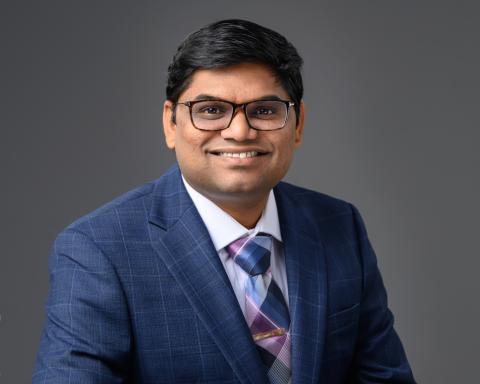Loading...
Kishore Singirikonda
Baylor EMBA, Healthcare Administration, 2022
Director of Pharmacy, North Central Surgical Center Hospital
Practical Leadership, a Family Tradition
By Suzi Morales
Business leadership is in Kishore Singirikonda’s blood. His father built a sales business with 20 employees from the ground up. Singirikonda has always admired his father’s leadership qualities and envisioned himself in a leadership position.
With an undergraduate degree in pharmacy and a master’s in clinical analytical chemistry, Singirikonda worked for nearly fifteen years as a pharmacist. He noticed that there weren’t a lot of clinicians, and even fewer pharmacists, in healthcare administration leadership.
“Sometimes they lacked the perspective of the pharmacy department, probably because there is no voice in that boardroom who could speak for us,” Singirikonda says. There simply wasn’t anyone in leadership who had the experience to understand the outcome of decisions affecting pharmacists. “So I thought I should probably fill that void.”
To fill that void, Singirikonda came to the Dallas Executive MBA (EMBA) program at Baylor University Hankamer School of Business. He’d looked at other programs, but what set Baylor apart was the Healthcare Administration Concentration.
Learning from leaders in the field
One of Singirikonda’s favorite professors was adjunct lecturer Glenn Robinson, who had been president of Baylor Scott & White Medical Center for many years and also held leadership positions at other medical centers. “Anything he would teach was like gold because it was real-time experience,” says Singirikonda.
Robinson frequently invited guest speakers to his class, including the CEO of a surgery center. “Even though I was in healthcare, I wasn't aware much about the surgery centers or how they work or what their role is,” Singirikonda recalls. After the guest lecture, he added surgery centers to his job search, landing a position before graduation as the director of pharmacy at North Central Surgical Center Hospital.
“The beauty about a surgery center is it's like a mini hospital,” Singirikonda says. “I have to deal with the nursing leadership every day and work as a team with the lab leadership or with the radiology department. Surgery centers give me exposure to managing the whole hospital but it's on a smaller scale. I thought this would be a perfect start for me.”
Each EMBA student in Singirikonda’s cohort was matched with a leadership coach. Singirikonda’s coach, Dianne Dismukes, was a registered nurse former COO, and CEO of a health system. He consulted with her and discussed the opportunities for growth with the surgery center and how it would provide solid training to work at a range of healthcare facilities. In the time that he has been in his current position, those observations have turned out to be true.
Putting it into practice
Founded as a physician-owned ambulatory surgery center in 2005, the North Central Surgical Center experienced rapid growth to a fully licensed hospital offering services including imaging and outpatient surgery. The transition from a family-owned entity to the corporate-owned facility it is today requires a leader who can wear many hats: understanding regulatory requirements, communicating with the board, and collaborating among departments.
Singirikonda’s background as a pharmacist and leadership training through the EMBA program gave him the perfect combination of skills and experience for the role as the head of pharmacy. He interacts daily with leaders of other departments and works proactively to resolve issues as they arise.
Singirikonda is the sort of leader who would rather pick up the phone or walk down the hallway to a colleague’s office than spend his days sending emails. “I think sometimes it's just not about what you say, but how you say it. Having an MBA and going through these leadership classes does give you that edge on how to deal with people,” he says.
For example, Singirikonda learned in his negotiations class about the importance of sharing intangibles such as information. At work, his pharmacy staff wanted interdepartmental communication devices like the iPhones many nurses used but had previously been told the devices weren’t in the budget. He explained to leadership how important rapid communication is to pharmacists to help colleagues in other departments quickly access their patients’ medication orders. With this insight, they found room in the budget for the devices.
A supportive environment
When he started the EMBA program, Singirikonda had been out of the classroom for many years, like the majority of his classmates. He was attracted to the flexibility of the program and the ability to take classes on weekends, but says “it was not a cakewalk.” The MBA program required sacrifices not only from him but also from his wife and two children. Classes were challenging, especially on top of his already busy work schedule. But, he says, the intensive nature of the coursework helped him prepare for the pressures of executive leadership.
EMBA classmates also provided each other with a strong support network. Despite their extensive work experience, he describes his cohort as “down to earth.” “It was an awesome class,” he says. “Everybody was on the same level. … We were helping each other out.”
Singirikonda's strong belief in gratitude and community involvement significantly influences his life, evident through his contributions and volunteer efforts.
He says his EMBA has proved valuable in these efforts as well. As the board secretary of the Hindu Temple of Frisco, he has used what he learned about communication and understanding legal and regulatory frameworks to parse the organization’s bylaws and guide the board in its fundraising efforts.
As the first member of his family to earn an MBA, Singirikonda was proud to be able to celebrate with his father, who was his inspiration for a career in leadership. He remembers graduation day, surrounded by family members and friends, noting, “Support is what you need at the end of the day.”
To learn more about how the Executive MBA in Healthcare Administration program can support your leadership goals, see here. You can also Request More Information here.
